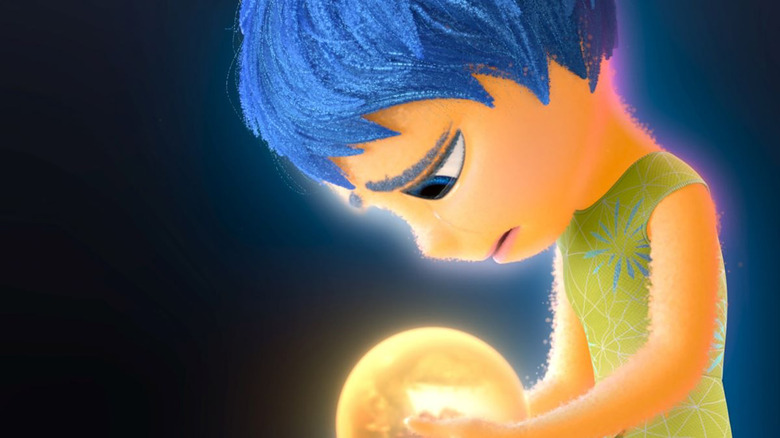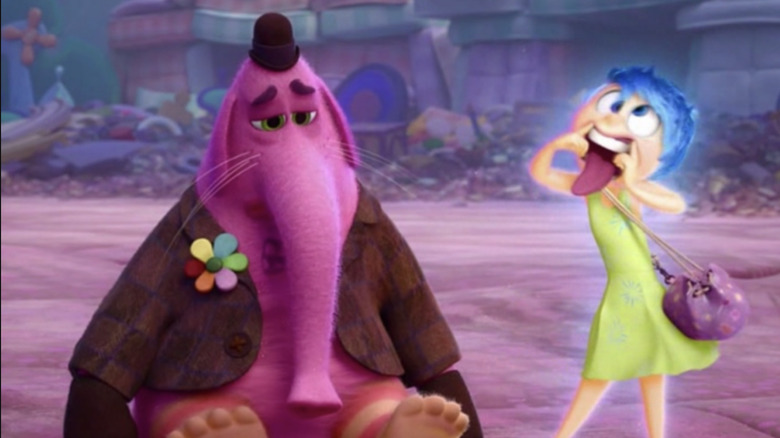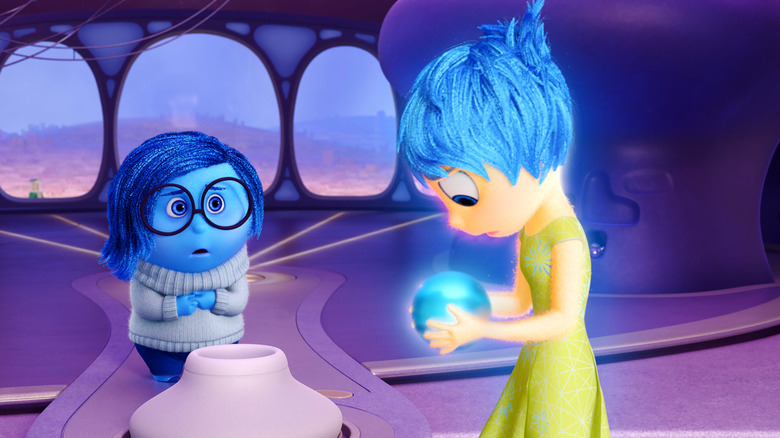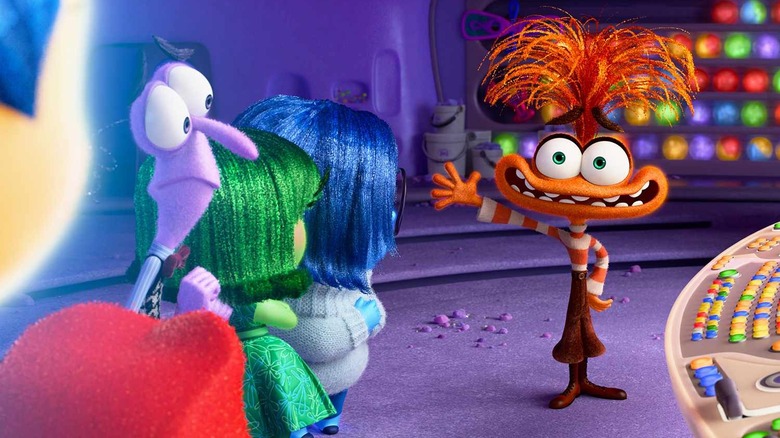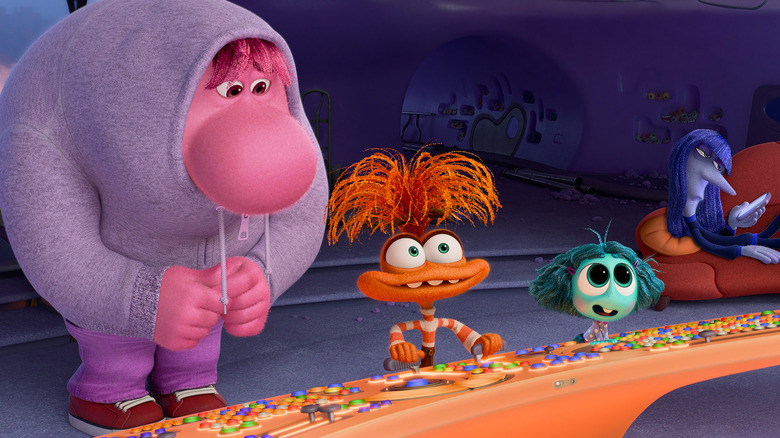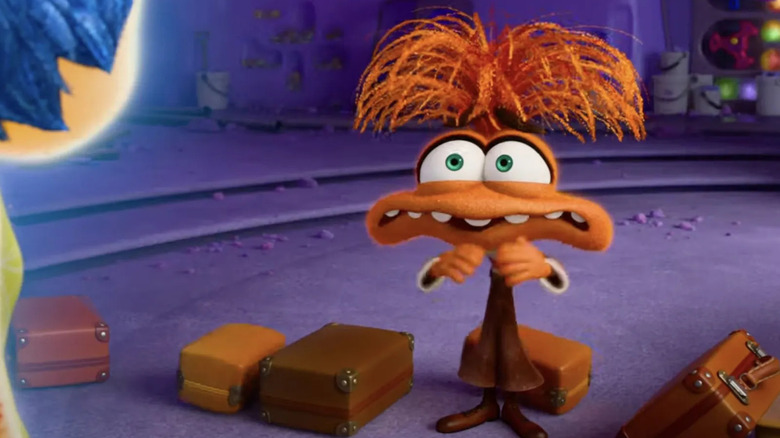Inside Out Wrecked Me — And Inside Out 2 Wrecked Me For Very Different Reasons
This article contains spoilers for "Inside Out" and "Inside Out 2."
When "Inside Out" premiered in 2015, adults admitted without shame that the Pixar movie where emotions have emotions melted them into giant puddles. I was no different. I caught the film during a weekday matinee and had the entire theater to myself. No screaming kids, no teens texting, and I had the best seat in the house.
This also meant that I was a sight for the poor minimum-wage worker who found an adult woman crying so hard she was dry heaving, alone, after a family film.
Bing Bong's death is typically what reduces adults to tears, but after the devastation of "Toy Story 3," the (at the time) trilogy conclusion of the very first movie I saw in the theater, I was immune to anything dealing with the devastating personification of growing beyond childish wonders. For me, it's when Sadness takes control of the console. All of Riley's happy core memories are now sad. The good times she had now bring her pain because they're memories from a life she no longer lives. The console turns blue, and Riley finally breaks down in front of her parents.
"You need me to be happy but [...] I want to go home. Please don't be mad."
Riley's confession felt like it had been plucked from my Headquarters, with my own tiny version of Sadness finally taking over from a worn-out Joy because when I saw "Inside Out," I was in recovery from my second pancreatic cancer treatment surgery. Sure, I was fatigued from hospital visits, but I was more exhausted from pretending I was taking it all in stride so those who loved me wouldn't worry.
I had been rejecting my Sadness for over a year.
Forcing positivity cannot save us
I've previously talked about how my cancer diagnosis directly impacts the way I consume media, but I've never written about my "Inside Out" experience because to do so requires being vulnerable about how other people were affected by (and often poorly handled) my illness. When a doctor tells you that you're dying, it becomes the only thing you can think about. Every second of every day was consumed by the possibility that it would be my last, which meant I had plenty of time to grieve, rage, mourn, and process what was happening to me.
My friends and family, on the other hand, would remember in small bursts — life going on as normal until a reminder would pop up of, "Oh yeah, she's going to die from this." That's not the fault of anyone who loves me, that's just reality. We're all aware of the atrocities happening in the world but unless it's happening in front of our faces, at that second, it won't always be an all-consuming thought. Seeing my discolored skin or hearing my weakened voice was as if I was telling them I was sick for the first time all over again. There would be tears, so many tears, and it got harder and harder to deal with how my illness was bringing so much pain to so many people. I know it wasn't on me to make other people feel better, but I didn't know what else to do.
So, I embraced Joy and only Joy. Every day I was "feeling good all things considered," I cracked dark jokes non-stop, I stopped hiding my drainage tube and wore it like a badge of honor no matter how many people stared. I was "brave," I was "resilient," I was a "fighter," I was an "inspiration," and I was lying about how sick I felt, how much pain I was in, and how miserable I was. Toxic positivity was eating my brain while cancer was eating my body.
The life-changing power of crying
I've gotten really good at maintaining a straight face when people around me are crying because if I cried every time someone would cry about my being sick, I would have never stopped crying. It's a very odd skill to have in my arsenal and one I still have very complicated feelings about. Whenever I tell my "crying alone in a theater to 'Inside Out'" story to people, I always act like it was some random coincidence, like the time I saw "Up" in 3D after taking acid thinking the colorful balloons would be a gorgeous experience, only to be pummeled by those opening 10 minutes I didn't know were coming. (Don't do drugs, kids.)
But the truth is that I had heard people say "Inside Out" made them cry, and I needed that catharsis. I didn't know what would make me cry, I just knew that if I didn't cry soon, all of my pent-up emotions were going to kill me before cancer could. As Sadness rightfully explained in the movie, "Crying helps me slow down and obsess over the weight of life's problems." And so I went to see "Inside Out" alone in the middle of the day.
Reader, I need you to imagine the noisiest, most physically demanding cry you've ever let out. It was like that, but harder, and with the volume control of a two-year-old who just dropped their ice cream in gravel because I was crying so hard the contractions of my dry heaving diaphragm were irritating my fresh scar tissue and incision sites. I was finally free.
From that day forward, I never denied my Sadness, but I did deny my Joy.
Welcome to the party, Anxiety
After year five of treatment, my doctors started using the word "miracle." I have complications, unexplainable pains, and a litany of permanent side effects from treatment and surgery, but I'm not immediately going to die. I was asked to write a living will when I was 23 years old and suddenly I had my life back, but one that I had already mourned as never happening. I thought that this meant I could finally let Joy back into my life ... but I couldn't. My new lease on life came with an asterisk — uncontrollable anxiety about my cancer's inevitable return, because it will return, and a whopping case of survivor's guilt. When I was sick, I felt the need to push forward with Joy not just because I was sick, but because my dad also had cancer, and so did one of my best friends (that backlink makes sense, I promise), who tragically did not have the same outcome that my father and I had.
Having cancer in my 20s aged me what feels like a century, and one of the major themes of "Inside Out" is about how growing up requires its own special type of grief. I was alive, yes, but I was grieving the years I lost, grieving the future I'll never get to experience because of the side effects (for example, having children), and struggling to accept that I was still here while so many people have died from the same illness or others like it. My emotions were in constant conflict and I didn't know what to think let alone feel.
Whether I wanted her to or not, that's when Anxiety took control of my console and didn't let go.
'I don't know how to stop Anxiety'
10 years after my initial diagnosis and nine years after bawling alone in a rural Ohio theater, my life looks incredibly different. I'm married, I live in Los Angeles, and I spend my life writing and talking about movies. The life I thought I'd never get to experience, I'm getting to live out. Most people I meet don't even know I was ever sick. I should be nothing but Joy, but Anxiety is still very much in control and has been for years. Just when I thought Joy was going to get her hands back on the console, the pandemic hit. Anxiety held on tighter. And I'll admit, I've been growing more anxious every day. I feel like I'm one inconvenience away from a panic attack at any moment and every laugh is a piss-poor attempt to cover up how scared I am all. the. time.
"I don't know how to stop Anxiety, Maybe we can't. I guess this is just what happens when you grow up, you feel less ... Joy," the eponymous Emotion declares. And then I sat in a packed press screening of "Inside Out 2," and bawled my eyes out. As the film went on, I couldn't stop. A small sniffle here, a singular tear there. The waterworks just kept coming. If I were Bing Bong, I'd have overflowed the AMC Burbank 16 with candy.
Because Joy is right.
Growing up isn't just growing older, it's also becoming acutely aware of how broken everything is, and how broken everyone around us is too. We struggle to remember the little things in life that bring us Joy and become consumed by existential dread, the acknowledgment of our own mortality, and the realization of just how little control we have in our lives. I can't change that I had cancer, but I can control how I let it affect me.
But if that were true, why won't my Anxiety just let go of the console?
She's just trying to protect me
The core conflict in "Inside Out 2" is that the now 13-year-old Riley is going through puberty and struggling more than ever to regulate her emotions. Anxiety takes control of her console in Headquarters, and it completely changes her Sense of Self. Everything in her life starts falling apart, and Anxiety is moving so fast trying to fix it that she turns into a tornado the other Emotions can't get through. Even when Joy finally does get through to her, Anxiety can't let go of the console, even if she wants to. It's a feeling I know all too well, so when it cuts to the outside of Headquarters and we see Riley having her first panic attack, I thought like I was going to have one right there in the theater.
"I'm sorry, I was just trying to protect her," Anxiety says.
Hearing Maya Hawke's perfect delivery broke me. I cried and I cried and I couldn't stop. Because Anxiety is right too. Life is so f***ing hard for so many reasons, and anxiety is our mind's way of kicking it into overdrive and trying to protect us from having to endure any more trauma. Sometimes Anxiety gets a little carried away, but it isn't malicious — it's our brain trying to help. Just as Riley's bad memories previously tossed to the back of her mind flooded toward the forefront, mine did as well. Everything I had been pushing aside for years and years overwhelmed me but this time, I wasn't alone. No one in that theater knew specifically why I was crying, but I didn't know why they were crying either. And it doesn't matter. I didn't need to think, I needed to feel.
I don't know which emotion is in control of my console anymore, and honestly, I think it's okay that I don't know. Because what I do know is that no matter who is in charge, they're trying their best, because I'm trying my best, and it's an honor to even still be here to try.
